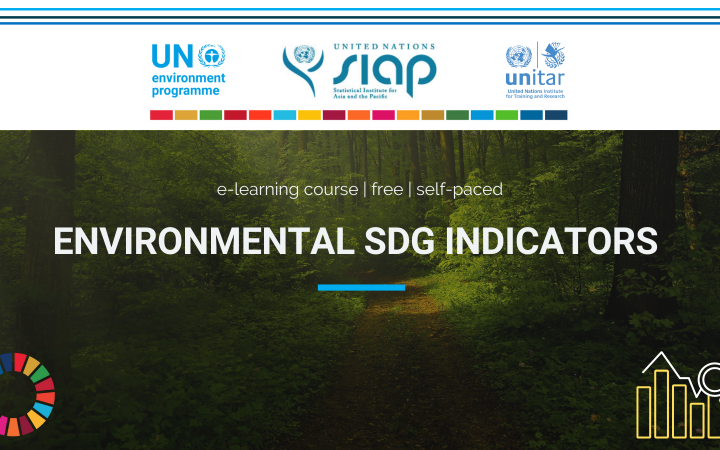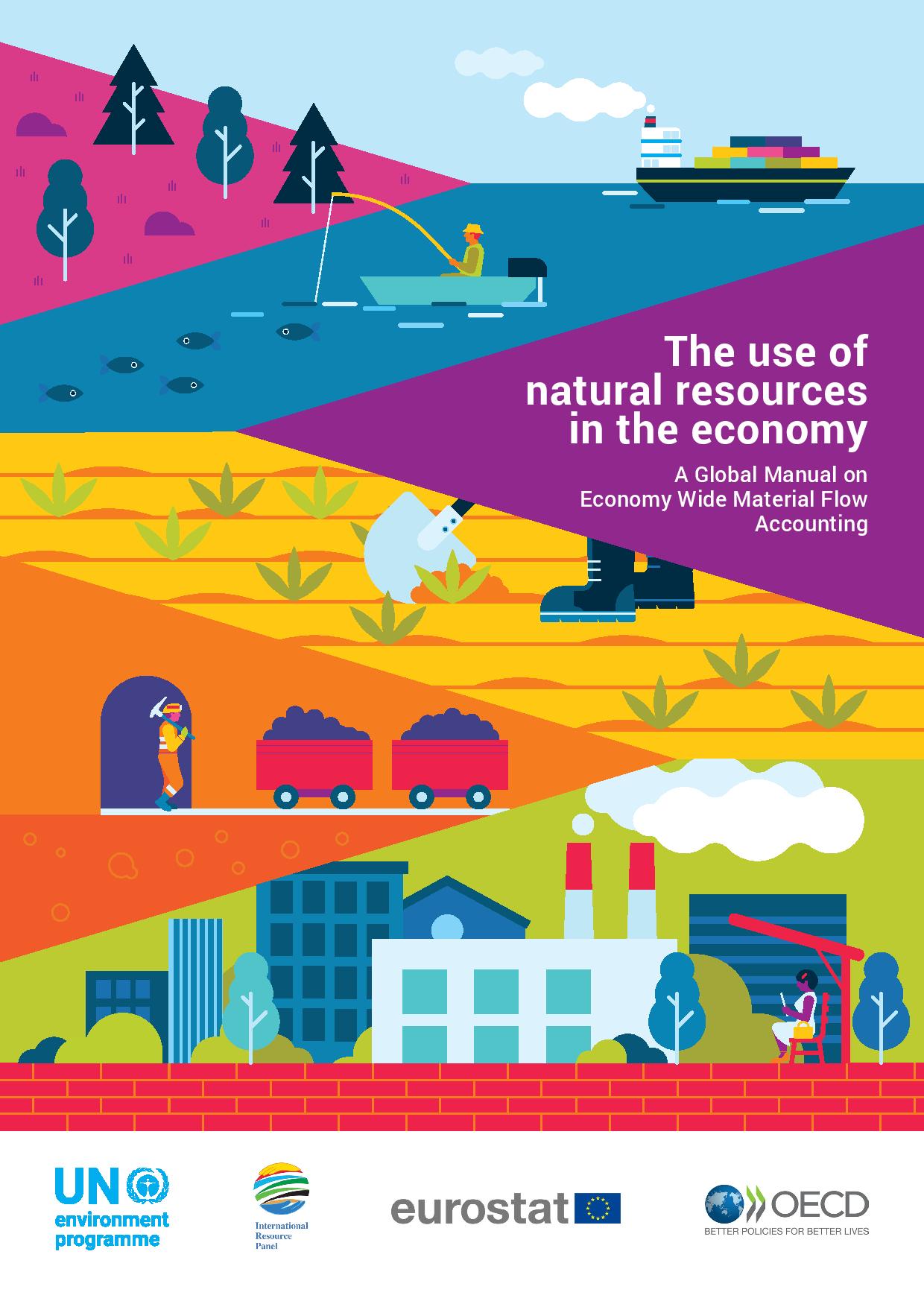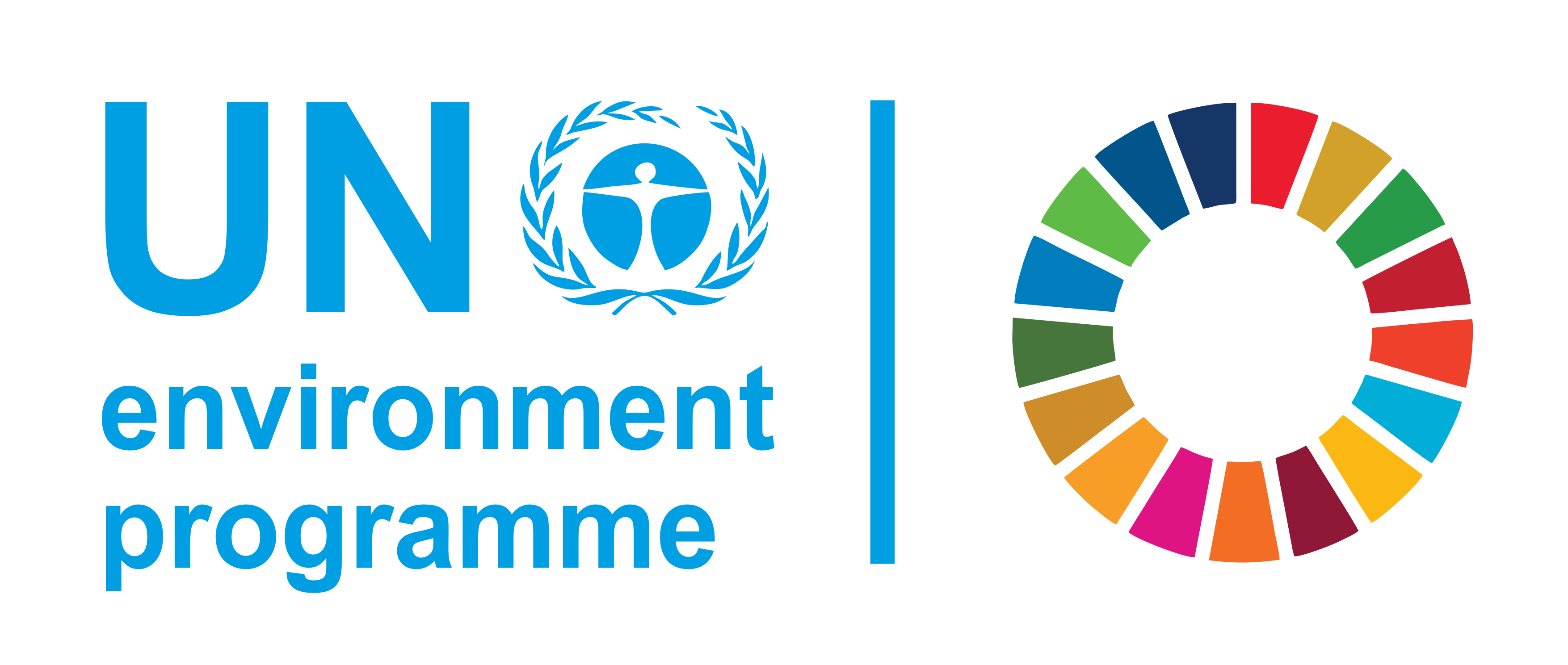The 2030 Agenda for Sustainable Development has elevated the profile of the environmental dimension of development and how we monitor this dimension. From 2020 to 2023, the United Nations Environment Programme (UNEP) implemented the project on Enhancing Capacity for Measuring Progress towards the Environmental Dimension of the Sustainable Development Goals (SDGs), funded by the European Commission. The project aimed to strengthen national capacity for designing coherent and integrated policies for sustainable development, monitoring, and reporting on the environmental dimension of the SDGs, through:
- Enhancing capacity on environment statistics through training programmes
- Ensuring dissemination and uptake of the global methodologies through targeted capacity development for key SDG indicators at the national level
- Deepening UNEP’s analysis of trends at the global and regional levels, including interlinkages between the various goals, targets and indicators
- Special focus on SCP (SDG 12) and policy coherence (SDG 17) indicators
Carrying out and publishing a multidisciplinary integrated analysis of progress towards the 2030 Agenda
Today at the half-way point for the SDGs, UNEP is preparing to provide important intelligence on the progress we are making on the environmental dimension. The latest available data and estimates for 92 environment relevant SDG indicators tell us that the world is not on track to achieve the environmental dimension of the SDGs by 2030. However, there is some positive news. Global data availability increased to 59% in 2022, from 34% in 2018 and 42% in 2020. Although only 38% of the environment-related indicators indicate environmental improvement, this is a solid improvement compared to only 28% in 2020. These are only glimpses of the report that informs on: (a) progress on the 92 environment-related SDG indicators, (b) interlinkages analysis between water-related indicators and other economic and social indicators, and (c) using big data and citizen science data to close the data gap.
UNEP has launched the second version of Measuring Progress entitled Measuring Progress: Environment and the SDGs. It was launched on the international day for biodiversity in May 2021 and the purpose of the publication was to explore the potential and limitations of a statistical correlation analysis between SDG indicator pairs to improve the understanding of interlinkages among the indicators. The publication also informed on progress made for the 92 environment-related SDG indicators as well as identifying gaps and opportunities for data availability among those indicators.
Visibility activities
Development of tools and training for capacity building to measure, monitor and report on the environmental dimension of the SDGs delivered in the target countries
Technical Presentations
 This e-learning course is a self-paced course with individual 10 modules developed by the United Nations Environment Programme (UNEP), the United Nations Statistical Institute for Asia and the Pacific (UNSIAP), and the United Nations Institute for Training and Research (UNITAR). This course provides an overview of the importance of monitoring the environmental dimension of development, the linkage with existing statistical frameworks (FDES and SEEA), and how to use environment statistics in decision making. The modules will also provide a brief overview on all 25 SDG indicators under UNEP custodianship. This e-learning course is also available in Russian and in French.
This e-learning course is a self-paced course with individual 10 modules developed by the United Nations Environment Programme (UNEP), the United Nations Statistical Institute for Asia and the Pacific (UNSIAP), and the United Nations Institute for Training and Research (UNITAR). This course provides an overview of the importance of monitoring the environmental dimension of development, the linkage with existing statistical frameworks (FDES and SEEA), and how to use environment statistics in decision making. The modules will also provide a brief overview on all 25 SDG indicators under UNEP custodianship. This e-learning course is also available in Russian and in French.
 This e-learning course on Economy Wide Material Flow Accounting (EW-MFA) delivers a very comprehensive overview of natural resource extraction, trade in natural resources, waste disposal and emissions. These flow accounts track the environmental pressures resulting from the use of natural resources, and headline indicators based on EW-MFA have been used as a stand-in for the overall environmental pressure and impact of a country's economy.
This e-learning course on Economy Wide Material Flow Accounting (EW-MFA) delivers a very comprehensive overview of natural resource extraction, trade in natural resources, waste disposal and emissions. These flow accounts track the environmental pressures resulting from the use of natural resources, and headline indicators based on EW-MFA have been used as a stand-in for the overall environmental pressure and impact of a country's economy.
 The Global Chemicals and Waste Indicator Review Document aims to strengthen the knowledge base of chemicals and hazardous waste and enhance the capacity of selected countries to track progress towards related SDG indicators across sectors. With the purpose of enhancing evidence base as well as the science policy interface, this review document responds to the need for better information to empower decision makers and stakeholders to act and support policy making for sound management of waste to minimize risks to public health and the environment associated with chemicals and hazardous waste. This review document is available in Arabic, English and Russian.
The Global Chemicals and Waste Indicator Review Document aims to strengthen the knowledge base of chemicals and hazardous waste and enhance the capacity of selected countries to track progress towards related SDG indicators across sectors. With the purpose of enhancing evidence base as well as the science policy interface, this review document responds to the need for better information to empower decision makers and stakeholders to act and support policy making for sound management of waste to minimize risks to public health and the environment associated with chemicals and hazardous waste. This review document is available in Arabic, English and Russian.
 MFA data sets and indicators are part of the work programme of a growing number of national statistical offices globally and the global application of EW-MFA accounts in national statistics, beyond Europe, has required the creation of a global guidance manual. This global EW-MFA manual builds on the experience and excellence of the Eurostat accounting guidelines but extends them in several important ways. The global EW-MFA manual presents a modular approach to EW-MFA accounting to allow national statistical offices with different levels of capability in accounting to establish the accounts. It addresses specific issues of resource-extractive economies and subsistence economic activities which are more prevalent in developing countries. The manual favors practicality before detail and focuses on such methods that allow statisticians to capture the important aspects of material throughput in their economy. Additionally, it also aims to establish a connection between the EW-MFA accounts established, and the environmental and economic policy questions that can be informed by using EW-MFA based data sets and indicators.
MFA data sets and indicators are part of the work programme of a growing number of national statistical offices globally and the global application of EW-MFA accounts in national statistics, beyond Europe, has required the creation of a global guidance manual. This global EW-MFA manual builds on the experience and excellence of the Eurostat accounting guidelines but extends them in several important ways. The global EW-MFA manual presents a modular approach to EW-MFA accounting to allow national statistical offices with different levels of capability in accounting to establish the accounts. It addresses specific issues of resource-extractive economies and subsistence economic activities which are more prevalent in developing countries. The manual favors practicality before detail and focuses on such methods that allow statisticians to capture the important aspects of material throughput in their economy. Additionally, it also aims to establish a connection between the EW-MFA accounts established, and the environmental and economic policy questions that can be informed by using EW-MFA based data sets and indicators.
Capacity Building
Regional Workshops
- Sub-Regional Workshop on Strengthening Coordination for Measuring Progress on Responsible Consumption and Production and Policy Coherence, West Africa
When: 23-25 November 2021
Venue: Kudo, VIRTUAL
Countries: Cap Verde, Guinea Bissau, The Gambia
Workshop Report - Sub-Regional Workshop on Strengthening Coordination for Measuring Progress on Responsible Consumption and Production and Policy Coherence, South Asia
When: 30 November-2 December 2021
Venue: MS Teams, VIRTUAL
Countries: Bangladesh, India, Iran, Nepal, Sri Lanka
Workshop Report - Regional Workshop on Strengthening Coordination for Measuring Progress on Responsible Consumption and Production and Policy Coherence
When: 7 - 9 December 2021
Venue: Kudo, VIRTUAL
Countries: Armenia, Austria, Azerbaijan, Belarus, Bosnia and Herzegovina, Croatia, Georgia, Kazakhstan, North Macedonia, Russia, Serbia, Turkey, Ukraine, Uzbekistan
Workshop Report - Sub-Regional Workshop on Strengthening Coordination for Measuring Progress on Responsible Consumption and Production and Policy Coherence, East Africa
When: 11-13 January 2022
Venue: MS Teams, VIRTUAL
Countries: Ethiopia, Kenya, Mauritius, Mozambique, South Sudan
Workshop Report
National activities
As part of the project activities, UNEP has implemented national activities in the project beneficiary countries. The focus of the national activities was to strengthen the statistical capacities of government officials in these countries to collect and disseminate data related to SDG indicators. The national activities covered the following SDG indicators:
- Training on material flow indicators (SDG indicators 8.4.1/12.21 on material footprint and 8.4.2/12.2.2 on domestic material consumption)
- Training on waste statistics (SDG indicators 12.4.2 on hazardous waste generated and treated and 12.5.1 on national recycling rate)
- Training on policy coherence (SDG indicator 17.14.1):
- Indicator 17.14.1: Number of Countries with Mechanisms in Place to Enhance Policy Coherence of Sustainable Development
- Domain 1: Institutionalized political commitment
- Domain 2: Long-term Considerations
- Domain 3: Interministerial and Cross-sectoral Coordination
- Domain 4: Participatory Processes
- Domain 5: Integration of the Three Dimensions of Sustainable Development, Assessment of Policy Effects and Linkages
- Domain 6: Consultation and Coordination Across Government Levels
- Domain 7: Monitoring and Reporting for Policy coherence
- Domain 8: Financial Resources and Tools
- Training on food waste (SDG indicator 12.3.1b):
- SDG 12.3.1b on Food Waste Index Guidance and Updates
- Tracking Progress and Delivering SDG 12.3
- Definitions - Guidance for Countries to Measure Food Waste
- Household Measurement Methods
- Edible and Inedible Waste
- Food Waste Destinations
- Diary Methodology
- Looking Towards Tomorrow – Food Service and Retail
- Food Service Measurement Methods
- Quantification Frameworks
- Retail Measurement Methods
The activities were implemented between May and December 2023. The countries that benefited from tailored national activities are Ghana, India, Jordan, Kazakhstan, Senegal and Uganda. As a result of the national activities implemented as part of this project, this report presents the challenges faced by countries and results obtained and highlights the lessons learned from the countries.
A Management-Led Terminal Review of the project was conducted between January and March 2024. The review sought to assess project performance (in terms of relevance, effectiveness, and efficiency), and determine outcomes and impacts (actual and potential) stemming from the project, including their sustainability.
The following documents are available online:






